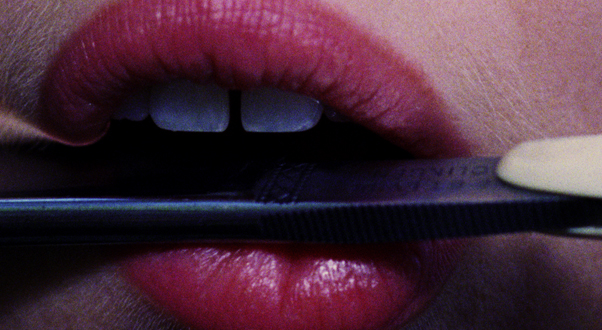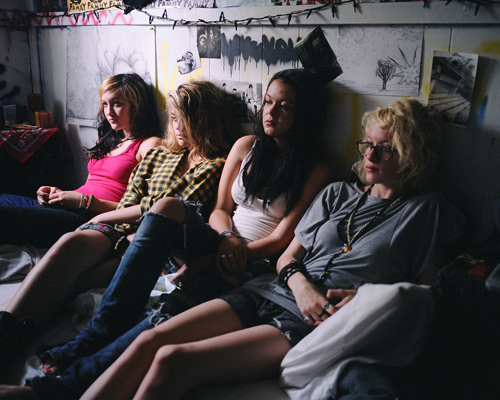
Friends gather in tender tale about a tight-knit community coming together for a funeral (photo © Joyce Kim, 2010)
PUTTY HILL (Matt Porterfield, 2011)
Cinema Village
22 East 12th St. between Fifth Ave. & University Pl.
February 8-14, 1:00, 3:00, 5:00, 7:00, and 9:00
212-924-3363
www.puttyhillmovie.com
www.cinemavillage.com
 The city of Baltimore has not exactly been depicted kindly in film and on television, with such series as Homicide: Life on the Street, The Wire, and The Corner: A Year in the Life of an Inner-City Neighborhood focusing on the rash of drugs and violence that have devastated the community, while native son John Waters has shown its wackier side in such films as Polyester and Hairspray. Born and raised in a suburb just inside the Baltimore city line, writer-director Matt Porterfield (Hamilton) has taken a different view in his second feature film, Putty Hill. When financing for his coming-of-age drama Metal Gods fell through, he decided to keep the cast and crew together and instead shoot a cinéma verité story about the after-effects of a young man’s drug overdose on a tight-knit community inspired by the one he grew up in. Not much is revealed about Cory as his funeral nears and life goes on, with his younger brother, Cody (Cody Ray), playing paintball with Cory’s friends; his uncle, Spike (Charles Sauers), tattooing customers in his apartment; and Spike’s daughter, Jenny (Sky Ferreira), returning to her hometown for the first time in several years and hanging out with her old friends like nothing much has changed. Working off a five-page treatment with only one line of scripted dialogue, Porterfield and cinematographer Jeremy Saulnier capture people just going on living, taking Cory’s death in stride; Porterfield interviews much of the cast, who share their thoughts and feelings in relatively unemotional ways. Shot on a minuscule budget in only twelve days, Putty Hill uses natural sound and light, nonprofessional actors, and real locations, enhancing its documentary-like feel, maintaining its understated narrative and avoiding any bombastic or sudden, big revelations. It’s a softly moving film, a tender tale about daily life in a contemporary American working-class neighborhood. The film opens today at Cinema Village and will include Q&As all weekend long, with such special guests as filmmakers Amos Poe (The Blank Generation), Jem Cohen (Benjamin Smoke), and Ross Kauffman (Born into Brothels), Yeasayer’s Chris Keating, film critics Jeronimo Rodriguez and Richard Brody, IFP’s Amy Dotson, and members of the cast and crew, followed by after-parties at Beauty Bar and Lit Lounge, with live performances by Co La, Dustin Wong, and Dope Body.
The city of Baltimore has not exactly been depicted kindly in film and on television, with such series as Homicide: Life on the Street, The Wire, and The Corner: A Year in the Life of an Inner-City Neighborhood focusing on the rash of drugs and violence that have devastated the community, while native son John Waters has shown its wackier side in such films as Polyester and Hairspray. Born and raised in a suburb just inside the Baltimore city line, writer-director Matt Porterfield (Hamilton) has taken a different view in his second feature film, Putty Hill. When financing for his coming-of-age drama Metal Gods fell through, he decided to keep the cast and crew together and instead shoot a cinéma verité story about the after-effects of a young man’s drug overdose on a tight-knit community inspired by the one he grew up in. Not much is revealed about Cory as his funeral nears and life goes on, with his younger brother, Cody (Cody Ray), playing paintball with Cory’s friends; his uncle, Spike (Charles Sauers), tattooing customers in his apartment; and Spike’s daughter, Jenny (Sky Ferreira), returning to her hometown for the first time in several years and hanging out with her old friends like nothing much has changed. Working off a five-page treatment with only one line of scripted dialogue, Porterfield and cinematographer Jeremy Saulnier capture people just going on living, taking Cory’s death in stride; Porterfield interviews much of the cast, who share their thoughts and feelings in relatively unemotional ways. Shot on a minuscule budget in only twelve days, Putty Hill uses natural sound and light, nonprofessional actors, and real locations, enhancing its documentary-like feel, maintaining its understated narrative and avoiding any bombastic or sudden, big revelations. It’s a softly moving film, a tender tale about daily life in a contemporary American working-class neighborhood. The film opens today at Cinema Village and will include Q&As all weekend long, with such special guests as filmmakers Amos Poe (The Blank Generation), Jem Cohen (Benjamin Smoke), and Ross Kauffman (Born into Brothels), Yeasayer’s Chris Keating, film critics Jeronimo Rodriguez and Richard Brody, IFP’s Amy Dotson, and members of the cast and crew, followed by after-parties at Beauty Bar and Lit Lounge, with live performances by Co La, Dustin Wong, and Dope Body.

 Declaring this to be “the Plastic Age,” Viennese filmmaker Werner Boote travels the globe in PLASTIC PLANET, seeking answers that are not very easy to come by about the mysterious material. Boote grew up around the plastics boom, his grandfather an early manufacturer of the non-biodegradable synthetic. Boote meets with former president of PlasticsEurope John Taylor, Italian judge and politician Felice Casson, environmental scientist Susan Jobling-Eastwood, Japanese artist Hiroshi Sagae, American biophysicist Scott Belcher, Austrian environmental analyst Kurt Scheidl, European Commission vice president Margot Wallstrom, German plasticization specialist Gunther von Hagens, and others, each of whom has a different relationship with plastic, some citing its many virtues, others emphasizing its myriad dangers. Perhaps the most important thing Boote discovers is the power of the plastics industry in maintaining secrecy over the exact chemicals that go into their products, claiming that the release of such information could ruin their businesses. Thus, people might know the specific ingredients in their food, but they are not privy to what goes into the packaging, and there’s nothing they can do about it. One Chinese press representative almost spills the beans, but the interview is cut short before she can give away any of her company’s secrets. Unfortunately, Boote is not quite as interesting a character as he thinks, and he tries too hard to remain relatively neutral about plastics in general, straddling a line that leaves viewers somewhat disengaged from his personal journey. Although the film does reveal some frightening facts and scary predictions, it lacks a continuous narrative flow, meandering much as Boote does around the world, with some segments filled with confusing or difficult-to-follow scientific data. Ultimately, PLASTIC PLANET wants to be more important than it is, which is a shame, because it had the potential to be so much more.
Declaring this to be “the Plastic Age,” Viennese filmmaker Werner Boote travels the globe in PLASTIC PLANET, seeking answers that are not very easy to come by about the mysterious material. Boote grew up around the plastics boom, his grandfather an early manufacturer of the non-biodegradable synthetic. Boote meets with former president of PlasticsEurope John Taylor, Italian judge and politician Felice Casson, environmental scientist Susan Jobling-Eastwood, Japanese artist Hiroshi Sagae, American biophysicist Scott Belcher, Austrian environmental analyst Kurt Scheidl, European Commission vice president Margot Wallstrom, German plasticization specialist Gunther von Hagens, and others, each of whom has a different relationship with plastic, some citing its many virtues, others emphasizing its myriad dangers. Perhaps the most important thing Boote discovers is the power of the plastics industry in maintaining secrecy over the exact chemicals that go into their products, claiming that the release of such information could ruin their businesses. Thus, people might know the specific ingredients in their food, but they are not privy to what goes into the packaging, and there’s nothing they can do about it. One Chinese press representative almost spills the beans, but the interview is cut short before she can give away any of her company’s secrets. Unfortunately, Boote is not quite as interesting a character as he thinks, and he tries too hard to remain relatively neutral about plastics in general, straddling a line that leaves viewers somewhat disengaged from his personal journey. Although the film does reveal some frightening facts and scary predictions, it lacks a continuous narrative flow, meandering much as Boote does around the world, with some segments filled with confusing or difficult-to-follow scientific data. Ultimately, PLASTIC PLANET wants to be more important than it is, which is a shame, because it had the potential to be so much more.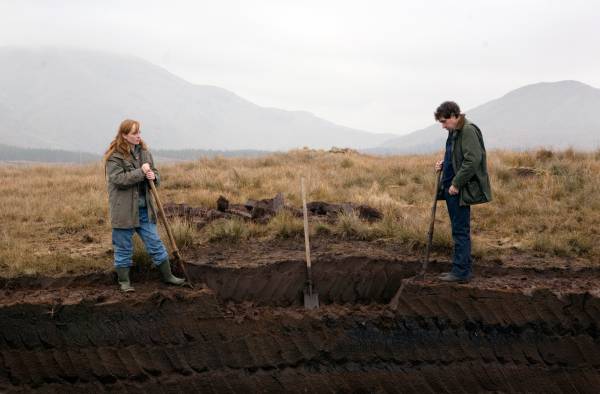
 Polish writer-director Urszula Antoniak’s debut feature film, NOTHING PERSONAL, is a muddled meditation on loneliness and the price of personal freedom. After walking out on her life for unstated reasons, a young Dutch woman (Lotte Verbeek) wanders the Irish countryside of Connemara, coming upon a cottage owned by a grumpy older man (Stephen Rea) who lives there alone, in the middle of nowhere. He offers her food in exchange for her tending to his garden, but at first she refuses, not wanting to have any real contact with other people, but she eventually relents, with one caveat: that he asks no personal questions of her, keeping their “relationship” at a distance. It soon becomes an intellectual boxing match as they spend more time together, deciding on what they each really want. Shot in Holland, Spain, and Ireland, NOTHING PERSONAL, winner of four Golden Calf awards at the 2009 Netherlands Film Festival, is a dreary and uncomfortable movie, with Antoniak’s heavy hand evident in nearly every scene, manipulating just how much information the characters will reveal, which ends up alienating audiences, who just won’t care about the two protagonists. There’s nothing personal about NOTHING PERSONAL, just a shivering coldness and chasm-like emptiness echoed by one of the jobs the man gives the woman; by the time it does start warming up, it’s too little, too late.
Polish writer-director Urszula Antoniak’s debut feature film, NOTHING PERSONAL, is a muddled meditation on loneliness and the price of personal freedom. After walking out on her life for unstated reasons, a young Dutch woman (Lotte Verbeek) wanders the Irish countryside of Connemara, coming upon a cottage owned by a grumpy older man (Stephen Rea) who lives there alone, in the middle of nowhere. He offers her food in exchange for her tending to his garden, but at first she refuses, not wanting to have any real contact with other people, but she eventually relents, with one caveat: that he asks no personal questions of her, keeping their “relationship” at a distance. It soon becomes an intellectual boxing match as they spend more time together, deciding on what they each really want. Shot in Holland, Spain, and Ireland, NOTHING PERSONAL, winner of four Golden Calf awards at the 2009 Netherlands Film Festival, is a dreary and uncomfortable movie, with Antoniak’s heavy hand evident in nearly every scene, manipulating just how much information the characters will reveal, which ends up alienating audiences, who just won’t care about the two protagonists. There’s nothing personal about NOTHING PERSONAL, just a shivering coldness and chasm-like emptiness echoed by one of the jobs the man gives the woman; by the time it does start warming up, it’s too little, too late.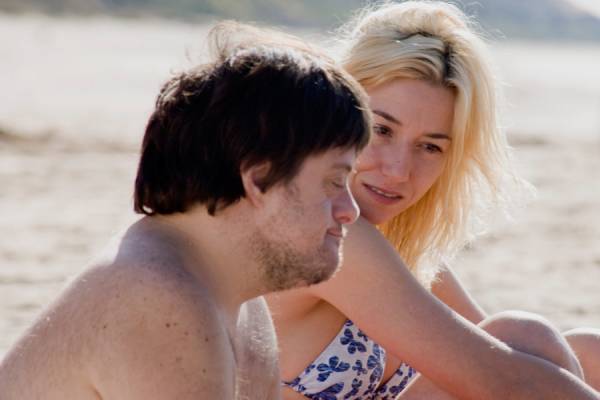
 Written and directed by first-time feature filmmakers Antonio Naharro and Álvaro Pastor, ME, TOO is a beautifully told story about a man with Down syndrome trying to make it in the so-called normal world. When Daniel (Pablo Pineda) first shows up for work at a government disability agency in Sevilla, Laura (Lola Dueñas) mistakes him for someone who has come seeking help, not the person who will be occupying the desk next to hers on a daily basis. Daniel does not see himself as a victim, and he is clearly not a charity case; instead, he has earned a university degree and refuses to allow his disease — or, more important, the way his disease is viewed by others — to limit the things he can accomplish in life. Soon Daniel and Laura grow very close, but she is unable to let their relationship reach the next level, regardless of how much they care for each other — and how many times she instead goes to a local bar and picks up strangers. Meanwhile, Luisa (Lourdes Naharro) and Pedro (Daniel Parejo), who both have Down syndrome and are members of the Danza Mobile dance company, which works with people suffering from intellectual disabilities, have fallen in love, but they feel free to express it, even in public, which gets them in trouble with Luisa’s mother (Catalina Lladó). The contrast between the two romances, one of which is “mixed” but both of which are complicated, is well handled by Naharro (who also plays Daniel’s older brother in the film) and Pastor, steering clear of the kind of sappy melodrama that could have compromised the film’s point of view. They deal with the issue of the infantilization and stereotyping of people with Down syndrome with just the right amount of honesty and subtlety to avoid becoming a pedantic message movie. Both Dueñas, an Almodóvar regular, and Pineda, making his cinematic debut, won Silver Shells for their acting at the 2009 San Sebastian Film Festival. Pineda is in fact the first person with Down syndrome in Europe to earn a major university degree, and he is endearing in the lead role, never overly sentimental, and the script avoids treacly moments, as does Guille Milkyway’s soundtrack. Codirector Pastor will participate in a Q&A following the 7:00 screening at Cinema Village on November 19.
Written and directed by first-time feature filmmakers Antonio Naharro and Álvaro Pastor, ME, TOO is a beautifully told story about a man with Down syndrome trying to make it in the so-called normal world. When Daniel (Pablo Pineda) first shows up for work at a government disability agency in Sevilla, Laura (Lola Dueñas) mistakes him for someone who has come seeking help, not the person who will be occupying the desk next to hers on a daily basis. Daniel does not see himself as a victim, and he is clearly not a charity case; instead, he has earned a university degree and refuses to allow his disease — or, more important, the way his disease is viewed by others — to limit the things he can accomplish in life. Soon Daniel and Laura grow very close, but she is unable to let their relationship reach the next level, regardless of how much they care for each other — and how many times she instead goes to a local bar and picks up strangers. Meanwhile, Luisa (Lourdes Naharro) and Pedro (Daniel Parejo), who both have Down syndrome and are members of the Danza Mobile dance company, which works with people suffering from intellectual disabilities, have fallen in love, but they feel free to express it, even in public, which gets them in trouble with Luisa’s mother (Catalina Lladó). The contrast between the two romances, one of which is “mixed” but both of which are complicated, is well handled by Naharro (who also plays Daniel’s older brother in the film) and Pastor, steering clear of the kind of sappy melodrama that could have compromised the film’s point of view. They deal with the issue of the infantilization and stereotyping of people with Down syndrome with just the right amount of honesty and subtlety to avoid becoming a pedantic message movie. Both Dueñas, an Almodóvar regular, and Pineda, making his cinematic debut, won Silver Shells for their acting at the 2009 San Sebastian Film Festival. Pineda is in fact the first person with Down syndrome in Europe to earn a major university degree, and he is endearing in the lead role, never overly sentimental, and the script avoids treacly moments, as does Guille Milkyway’s soundtrack. Codirector Pastor will participate in a Q&A following the 7:00 screening at Cinema Village on November 19.
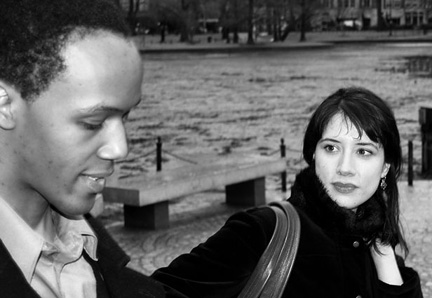
 Twenty-three-year-old writer-director Damien Chazelle expanded his senior thesis at Harvard into an unusual black-and-white musical that mixes John Cassavetes’s SHADOWS and FACES with Jacques Demy’s THE UMBRELLAS OF CHERBOURG (and a little French Nouvelle Vague) as seen through the modern lens of mumblecore. An accomplished jazz drummer, Chazelle (who makes a cameo in the film behind the kits) casts real-life jazz trumpeter and first-time actor Jason Palmer as Guy, a jazz trumpeter in a relationship with Madeline (Desiree Garcia), whom he met on a Boston park bench. But when Guy strays following a chance encounter on a train with a stranger named Elena (Sandha Khin) — an electrifying scene filled with heat and passion — Madeline leaves him, instead dreaming of making a new life for herself in New York. But as the two of them go their separate ways, they still imagine what could have been. The film features such actual musicians and dancers as Andre Hayward of the Jazz at Lincoln Center Orchestra, tap-dancer Kelly Kaleta, and teenage saxophone prodigy Grace Kelly. (Look for Chazelle’s father, Benard, as Paul.) Justin Hurwitz wrote the music for five of the original songs, with Chazelle supplying the lyrics. A slow-paced, heartfelt drama, GUY AND MADELINE ON A PARK BENCH has the improvisational feel of a quiet jazz solo, a soft, tender film about love and loss and how fragile meaningful relationships can be.
Twenty-three-year-old writer-director Damien Chazelle expanded his senior thesis at Harvard into an unusual black-and-white musical that mixes John Cassavetes’s SHADOWS and FACES with Jacques Demy’s THE UMBRELLAS OF CHERBOURG (and a little French Nouvelle Vague) as seen through the modern lens of mumblecore. An accomplished jazz drummer, Chazelle (who makes a cameo in the film behind the kits) casts real-life jazz trumpeter and first-time actor Jason Palmer as Guy, a jazz trumpeter in a relationship with Madeline (Desiree Garcia), whom he met on a Boston park bench. But when Guy strays following a chance encounter on a train with a stranger named Elena (Sandha Khin) — an electrifying scene filled with heat and passion — Madeline leaves him, instead dreaming of making a new life for herself in New York. But as the two of them go their separate ways, they still imagine what could have been. The film features such actual musicians and dancers as Andre Hayward of the Jazz at Lincoln Center Orchestra, tap-dancer Kelly Kaleta, and teenage saxophone prodigy Grace Kelly. (Look for Chazelle’s father, Benard, as Paul.) Justin Hurwitz wrote the music for five of the original songs, with Chazelle supplying the lyrics. A slow-paced, heartfelt drama, GUY AND MADELINE ON A PARK BENCH has the improvisational feel of a quiet jazz solo, a soft, tender film about love and loss and how fragile meaningful relationships can be.